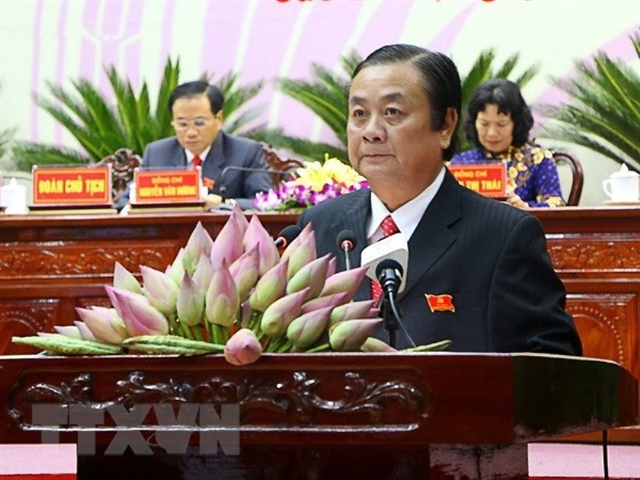Linking up with co-operatives, businesses will help farmers reduce losses: minister
The COVID-19 pandemic has impacted localities nation-wide, while many agricultural products are in the harvest season in the Cuu Long (Mekong) Delta region, meaning farmers cannot find traders to buy their products.

The COVID-19 pandemic has impacted localities nation-wide, while many agricultural products are in the harvest season in the Cuu Long (Mekong) Delta region, meaning farmers cannot find traders to buy their products.
The Ministry of Agriculture and Rural Development (MARD) wants farmers to link up with co-operatives or businesses to reduce losses. Minister of Agriculture and Rural Development Le Minh Hoan spoke to the media about it.
What plans does the ministry have to ensure farm products are produced in the delta region amid the strict social distancing?
As requested by the Prime Minister, the ministry established permanent working groups in the south including the Mekong Delta and co-ordinated on a daily basis with the Government's working group to organise many online working sessions with 19 localities in the south to promptly resolve problems and clear bottlenecks and obstacles in production, processing, harvesting, distribution, and purchase of agricultural products.
However, in the context of the pandemic and inconsistency in regulations between localities, production of and consumption chains related to a number of agricultural products are affected. For instance, sweet potatoes and pangasius are long due for harvest but have not been able to find buyers due to difficulties in distribution and transportation.
The general situation has improved somewhat, but there are still many difficulties due to the rapid spread of the disease over a large area.
What is the rice purchase situation in the Mekong Delta?
The consumption of agricultural products, especially rice, in the Mekong Delta has basically been resolved, and the price of rice has gone up by VND300-500 per kilogramme.
However, rice prices are unusually volatile in some places in the past few days. The reasons are the lack of rice traders and businesses' demand for rice not being met because of difficulties in distribution and transportation.
The Ministry of Agriculture and Rural Development will continue to closely monitor and gather information on output and the upcoming harvests, especially of rice, in the Mekong Delta.
Besides, the ministry will work with related associations to develop programmes to link up supply and demand.
The fact is that rice growing areas linked to enterprises are less affected, thanks to close co-operation.
The Ministry of Industry and Trade has called on the Government to study and enable the transport of rice by inland waterways. Transporting rice by water can help reduce the pressure on roads, help sustain the rice supply chain and ensure COVID-19 prevention and control.
How do you rate the 10kilo agricultural products package programme?
This is a good initiative by the 970 Working Group under the Ministry of Agriculture and Rural Development, directed by deputy minister Tran Thanh Nam.
It has helped the distribution of agricultural products to HCM City and provinces like Dong Nai and Binh Duong, helping people get agricultural products at reasonable cost, ensure quality and reduce the risk of disease transmission.
For this, more than 1,200 suppliers of vegetables, fruits, aquatic produce, and other items have registered with the ministry working group.
The group is piloting a combo package of 10kg of agricultural products that provinces and cities will buy. This package can help quarantined areas and workers living in boarding houses get affordable agricultural products at an average price of VND10,000 (US$0.4) per kilogramme.
Other localities are capable of supplying 800 tonnes of agricultural products a week to HCM City. The capacity could reach 1,500 tonnes a week if the 1,200 suppliers are involved.
Along with that, the ministry will soon introduce the ‘Information forum for connecting agricultural product production and consumption’ in localities severely affected by the COVID-19 pandemic.
The forum will also target many long-term goals such as trade promotion, linking up supply and demand and market information.
What do farmers need to do during this upcoming crop?
Our agriculture is high-yield and high-priced. In doing business, we cannot just depend on output or revenues, but must also calculate profits.
Therefore, farmers must come up with new thinking like connecting supply and demand information. The participation of farmers in co-operatives and linking production and consumption by businesses can help reduce crop risks.
Farmers produce agricultural products that can meet safety and quality standards to meet the market demand. Meanwhile, the ministry, enterprises and co-operatives play a role in policy making, searching, negotiating, and connecting markets. — VNS





